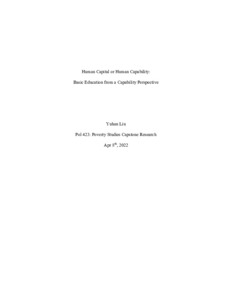| dc.rights.license | In Copyright | en_US |
| dc.creator | Liu, Yuhan | |
| dc.date.accessioned | 2022-04-21T13:02:47Z | |
| dc.date.available | 2022-04-21T13:02:47Z | |
| dc.date.created | 2022 | |
| dc.identifier | WLURG38_Liu_POV_2022 | |
| dc.identifier.uri | http://hdl.handle.net/11021/35838 | |
| dc.description | Yuhan Liu is a member of the Class of 2022 of Washington and Lee University. | en_US |
| dc.description | Capstone; [FULL-TEXT RESTRICTED TO WASHINGTON AND LEE UNIVERSITY LOGIN] | en_US |
| dc.description.abstract | This paper explores why access to quality basic education should remain an investment priority in the development field by comparing the human capital and human capability approach to education. Based on the analysis, the paper also provides policy recommendation to increase the effectiveness and efficiency of investment in education through program design. The literature review section of the paper provides an overview of the two main theories used to study the effect of education in international development: the human capital approach and human development approach. Then, it reviews existing empirical studies on the "returns to education," presenting the economic argument for investing in education. The methodology section provides the theoretical framework to model the capability-return to education. Then, the analysis section delves into the capability approach to education and discusses the positive effects of education on individuals' capabilities and the social benefits that extends from them. It makes the argument that societies are duty-bound to enable each child to complete at least a basic education. In the policy recommendations section, the paper explores two policy directions that enhances the effectiveness of investment in basic education. Overall, the paper argues that the returns on investment in basic education include not only monetary benefits but also in terms of multifaceted human capabilities. Thus, universal basic education should remain a policy priority and education policy should target the promotion of various human capabilities rather than the one-dimensional productivity gain. [From Background section] | en_US |
| dc.format.extent | 34 pages | en_US |
| dc.language.iso | en_US | en_US |
| dc.rights | This material is made available for use in research, teaching, and private study, pursuant to U.S. Copyright law. The user assumes full responsibility for any use of the materials, including but not limited to, infringement of copyright and publication rights of reproduced materials. Any materials used should be fully credited with the source. | en_US |
| dc.rights.uri | http://rightsstatements.org/vocab/InC/1.0/ | en_US |
| dc.subject.other | Washington and Lee University, Shepherd Poverty Program | en_US |
| dc.title | Human Capital or Human Capability: Basic Education from a Capability Perspective | en_US |
| dc.type | Text | en_US |
| dcterms.isPartOf | RG38 - Student Papers | |
| dc.rights.holder | Liu, Yuhan | |
| dc.subject.fast | Capabilities approach (Social sciences) | en_US |
| dc.subject.fast | Education | en_US |
| dc.subject.fast | Human capital | en_US |
| local.department | Shepherd Poverty Program | en_US |
| local.scholarshiptype | Capstone | en_US |
